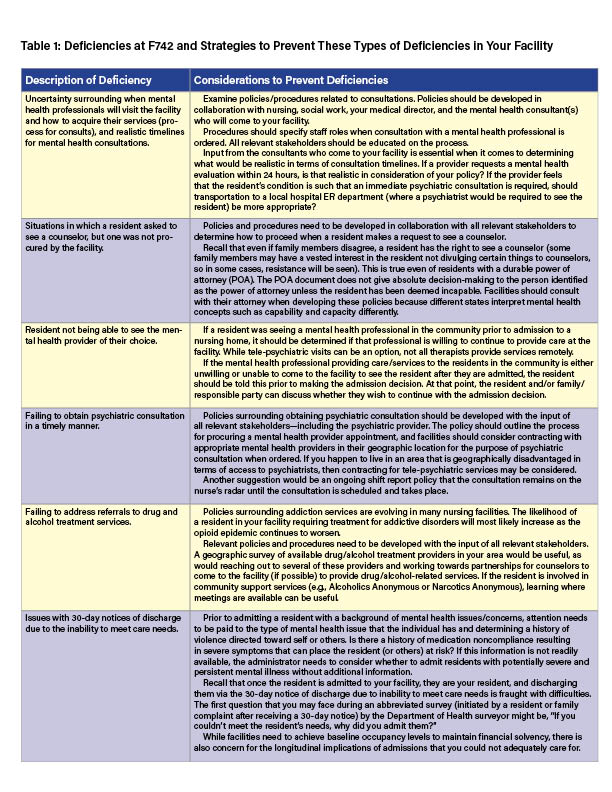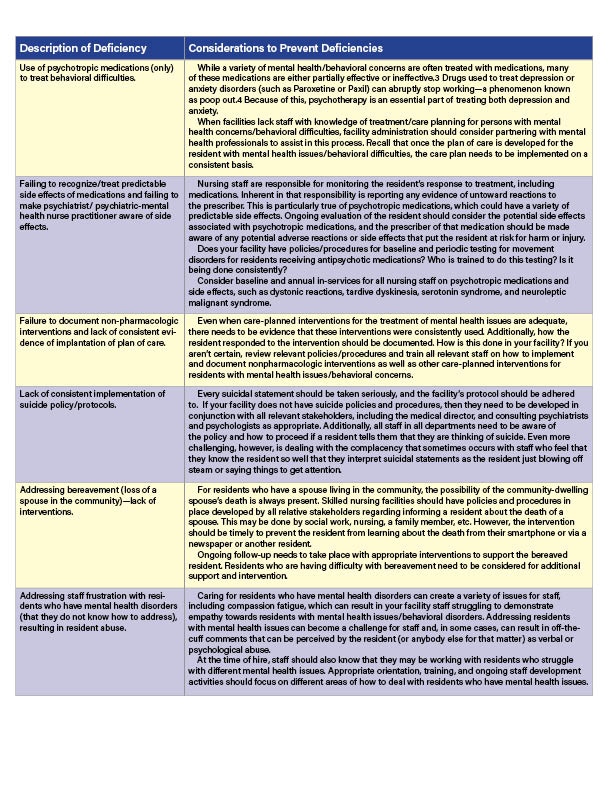Deficiencies at F742: Emerging Trends in the Enforcement of New Regulations
Timothy Legg
2/15/2024
In our last article, we explored emerging patterns in deficiencies at F699. In this article, we explore trends in deficiencies at F742. The relationship between citations at F699 and F742 is important because many of the citations given at F699 could have resulted in additional citations at F742. Recall that guidelines at F699 instruct surveyors to explore additional F-tags if concerns are found at F699, including tag F742. Identifying a deficiency at F699 may be related to being cited at F742. In fact, if a facility is cited at F699, there is roughly a 41 percent chance that the facility will also be cited at F742. Hence the importance of considering emerging trends in deficiencies at F742.
Like the first article in this series, we will discuss deficiencies obtained by SNFs in the CMS database in general terms, and specific deficiency instances with precise details (as outlined in the facility’s CMS-2567) will not be used/described as this could inadvertently lead to the identification of the facilities that received deficiencies. As the intention of this article is to learn about deficiency patterns and develop strategies to achieve and maintain compliance, the more general approach was felt to be the most useful. Again, for those readers who would like greater details, download Full Texts of 2567 Statements of Deficiencies directly from the CMS website and feel free to explore deficiencies in your area of interest.
F742: Treatment/Services for Mental/Psychosocial Concerns
This regulation, along with its investigative protocol and deficiency categorization (guidance to surveyors on how to cite deficiencies), which became effective in October 2022, requires that:
- §483.40(b) Based on the comprehensive assessment of a resident, the facility must ensure that—§483.40(b)(1) A resident who displays or is diagnosed with mental disorder or psychosocial adjustment difficulty, or who has a history of trauma and/or post-traumatic stress disorder, receives appropriate treatment and services to correct the assessed problem or to attain the highest practicable mental and psychosocial well-being.1
Patterns and Causes of Deficiencies at F742
From 2022 and 2023, Missouri skilled nursing facilities received the highest number of deficiency citations at F742 (57 facilities in the state received deficiency citations), followed by Ohio (41 citations), Illinois (31 citations), Colorado (30 citations), and Pennsylvania (25 citations). It is unknown why these state facilities received the most deficiencies. More time is needed to learn about the reasons for these patterns of deficiency.
Vicarious learning is useful when it comes to survey deficiencies—that is, learning about the reasons for deficiencies in other facilities enables us to examine the practices, polices, and procedures in our own facility.
 Table 1 lists a broad description of issues that were identified on the CMS 2567 for each facility that received deficiencies at F742, along with some thoughts about potential ways to prevent deficiencies.
Table 1 lists a broad description of issues that were identified on the CMS 2567 for each facility that received deficiencies at F742, along with some thoughts about potential ways to prevent deficiencies.


Implications for Older Adults with Mental Health Issues
 The emerging patterns of deficiencies for both 699 and F742 are resulting in conversations among some owners/operators of skilled nursing facilities considering whether they will admit residents with histories of trauma or mental health needs, especially those facilities in mental health provider deserts (defined as geographic locations where there is a paucity of mental health providers). Still, other high-performing nursing homes may decide not to admit residents with behavioral health issues because of the potential impact on survey outcomes and the Five-Star Quality Rating System. While this may sound far-fetched, a 2018 study concluded just that—residents who had been diagnosed with depression or anxiety had lower access to five-star nursing homes when compared to no behavioral health diagnoses.2 These disparities were not limited to patients with serious mental illness but were also associated with patients who had substance abuse—a problem that continues to worsen in America.
The emerging patterns of deficiencies for both 699 and F742 are resulting in conversations among some owners/operators of skilled nursing facilities considering whether they will admit residents with histories of trauma or mental health needs, especially those facilities in mental health provider deserts (defined as geographic locations where there is a paucity of mental health providers). Still, other high-performing nursing homes may decide not to admit residents with behavioral health issues because of the potential impact on survey outcomes and the Five-Star Quality Rating System. While this may sound far-fetched, a 2018 study concluded just that—residents who had been diagnosed with depression or anxiety had lower access to five-star nursing homes when compared to no behavioral health diagnoses.2 These disparities were not limited to patients with serious mental illness but were also associated with patients who had substance abuse—a problem that continues to worsen in America.
Timothy Legg is a board-certified gerontological and psychiatric/mental health nurse practitioner, licensed psychologist, licensed professional counselor, and state-licensed/nationally certified nursing home administrator. In addition to his private practice, he provides direct care and services to older adults in nursing homes as well as consultative services to nursing homes in Pennsylvania. Legg is an approved directed in-service provider by the Pennsylvania Department of Health.
References
1. United States Department of Health and Human Services. (2023). Revisions to State Operations Manual (SOM), Appendix PP.
https://www.hhs.gov/guidance/sites/default/files/hhs-guidance-documents/R211SOMA.pdf 2. Temkin-Greener, H., Campbell, L., Cai, X., Hasselberg, M. J., & Li, Y. (2018). Are post-acute patients with behavioral health disorders admitted to lower-quality nursing homes? American Journal of Geriatric Psychiatry, 26(6), 643-654.
3. Stahl, S. (2021a).
Stahl’s essential psychopharmacology (5th ed). Cambridge.
4. Stahl, S. (2021b).
Stahl’s essential psychopharmacology prescriber’s guide (7th ed.). Cambridge.